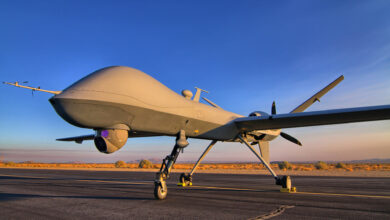Forces aligned with Khalifa Haftar’s self-styled Libyan National Army advanced to within 15 kilometers of a key United States operations center west of Tripoli prior to the evacuation of U.S. personnel from the area, a source with knowledge of the matter said.
“Due to increased unrest in Libya, a contingent of U.S. forces supporting U.S. Africa Command temporarily relocated from the country in response to security conditions on the ground,” AFRICOM, which is responsible for American military operations on the continent, said in a Sunday, April 7 statement.
“U.S. Africa Command’s mission in Libya involves military support to diplomatic missions, counter-terrorism activities, enhancing partnerships, and improving security across the region,” the statement read.
LNA forces are moving towards Tripoli from both the south and the west.
Numerous photos and videos were posted on social media on Sunday appearing to show a U.S. Navy Landing Craft Air Cushion hovercraft at a gated community known as Palm City in the Janzour area, west of Tripoli. LCACs are only used by the U.S. Navy and the Japan Maritime Self-Defense Force.
The “well-established” U.S. operations center hosted a contingent of U.S. Marines and was used by CIA and U.S. Navy SEAL teams to stage operations to counter violent extremist organizations in recent years, a source with direct knowledge of the matter told The Defense Post.
#Libya : Troops from Tarhuna declared support of #LNA & moved to #Tripoli fronts where new gains were made: From West axis, #LNA recaptured 27th gate area & entered in Şayyād village. From South axis, #LNA secured 4th streets & managed to enter in Ayn Zara & Salahadin district pic.twitter.com/LFP4eZK982
— @Suriyak (@Suriyakmaps) April 6, 2019
“U.S. Africa Command will continue to monitor conditions on the ground in Libya, and assess the feasibility for renewed U.S. military presence, as appropriate,” AFRICOM’s statement read.
AFRICOM declined to comment on the move, writing in an email that they could not “speak to the specific military capabilities, assets, and methods used to reposition forces. This protects our ability to conduct future operations of this nature.”
Haftar ordered a surprise offensive on Tripoli on Thursday, one day after Secretary General Antonio Guterres visited the city ahead of the United Nations-backed Libyan National Conference, set for April 14 to 16. The conference is intended to bring together delegates from across the country to draft a political roadmap to unify the country’s institutions and set a date for long-delayed national elections.
A U.N. call for a ceasefire from 4 to 6 p.m. on Sunday failed to slow the conflict, and the U.N. Humanitarian Coordinator in Libya Maria Valle Ribeiro on Monday reiterated the call for a “temporary humanitarian truce to allow for the provision of emergency services and the voluntary passage of civilians, including those wounded, from areas of conflict.”
She said more than 2,800 people had been displaced by violence in and around Tripoli and the fighting has prevented emergency services from reaching casualties and civilians, and damaged electricity lines.
The LNA advanced several kilometers northwards towards the city along the airport road on Sunday, reaching the neighborhood of Khalat Furjan, within a dozen kilometers of the city center, Reuters reported residents as saying.
LNA spokesperson Major General Ahmad Al-Mismari told a news conference on Sunday that LNA forces had “entered the area of Ain Zara, on the outskirts of the main streets of the city of Tripoli.”
Mismari said on Sunday the LNA was “surprised by the American presence in Tripoli,” claiming that there were “300 U.S. troops on Libyan territory,” Alwasat reported.
“They don’t need another Benghazi,” the source said of Sunday’s U.S. forces extraction, referring to the 2012 attack on the U.S. embassy and separate CIA site in that city that left four Americans dead, including Ambassador Christopher Stevens.
The LNA’s advances over the weekend prompted other evacuations as well. India evacuated its contingent of 15 Central Reserve Police Force peacekeepers from the city, External Affairs Minister Sushma Swaraj announced Sunday, and Italian gas company withdrew its personnel from Libya, the BBC reported.
The U.S. Embassy in Tripoli remains closed after it was evacuated by ground convoy escorted by U.S. Marines in 2014 as the security situation in the city deteriorated.
Then-Ambassador Deborah Jones overrode recommendations by Special Purpose Marine Air-Ground Task Force – Crisis Response (SPMAGTF-CR) for an evacuation by aircraft, requesting instead a low-profile vehicle convoy.
At the time, Colonel Kenneth DeTreux, then the Marine SPMAGTF-CR commander, described DOD support for U.S. personnel in high-risk posts as “the new normal” in Africa, Marine Corps Times reported.
The U.S. urged an immediate halt to Haftar’s offensive in a statement on Sunday. “Forces should return to status quo ante positions,” Secretary of State Mike Pompeo said.
Libyan government counter-offensive
After a pause overnight, fighting resumed Monday morning around the capital’s destroyed airport, around 25 km south of Tripoli, and the rural area of Wadi Rabi further east.
The situation around Tripoli is fluid and confused, with the two sides making conflicting claims about territorial control in the city’s outskirts. Some Libya analysts have pointed to significant amounts of social media traffic from outside the country.
Libyan social media/data researcher @k_ramali has been examining social media traffic related to recent escalation in #Libya. The KSA aspect of this (see below) is unprecedented. Huge pro-Haftar/LNA push. Begs questions of what transpired during Haftar’s recent visit to Riyadh. https://t.co/tMVkClNIp1
— Mary Fitzgerald (@MaryFitzger) April 7, 2019
Libya’s U.N.-backed Government of National Accord, based in Tripoli, announced a counteroffensive, dubbed “Volcano of Anger,” against the LNA advance on Sunday in order to “purge Libyan cities of aggressor and illegitimate forces.”
“The Libyan Army rejects coups and militarization of the state. Libya will always be a civilian state and the army will protect it and secure the people,” the Libya Observer reported Libyan Army spokesperson Mohamed Gnounou as saying.
The LNA said Sunday its forces had carried out their first airstrike on a suburb of Tripoli, a day after pro-GNA forces launched their own airstrikes, targeting at least one LNA position south of Tripoli in the Al-Aziziya area.
LNA spokesperson Ahmed al-Mismari said four airstrikes were conducted against its forces, Bloomberg reported. The LNA declared a no-fly zone in western Libya in response.
On Monday, the runway at Tripoli’s only functioning airport Mitiga, was targeted in an airstrike, authorities at the site said, though no casualties were reported.
The civil aviation authority decided “to suspend aerial traffic until further notice” to Mitiga airport, said Mohammed Gniwa, a spokesman for national carrier Libyan Airlines.
https://twitter.com/osamammmansour/status/1115010920886018054
‘Stabbed in the back’ by Haftar
Dozens of militias have fought for control of Libya since a NATO-backed uprising toppled and killed longtime leader Muammar Qaddafi in 2011.
Haftar, a former Qaddafi-era general once reportedly tied to the CIA, returned to Libya in 2011 after almost two decades in the United States, and assumed a prominent role in the conflict by 2014.
Haftar, most recently supported by Egypt, the United Arab Emirates, Russia and France, has vowed to take Tripoli for years. Militia forces believed to be aligned with him briefly seized control of parts of the western capital in May 2014 with the help of Zintan militias.
The LNA declared it had captured the eastern city of Benghazi in July 2017 after a three-year battle, then advanced to capture the Sirte oil basin before conducting a sweeping offensive across Libya’s restive south beginning in January 2019.
The chairman of the GNA’s Presidential Council Fayez al-Sarraj on Saturday vowed to defend the capital said his government had offered concessions to Haftar only to be “stabbed in the back” by the offensive.
Led by al-Sarraj and based in Tripoli in the west of the country, the Government of National Accord was established in 2015 under a U.N.-led initiative agreed upon by a parallel administration in Tobruk the east, which is supported by Haftar and his LNA.
But the unity government has struggled to assert control and accuses Haftar of wanting to install a military dictatorship.
In a Friday meeting with Guterres, Haftar reportedly said his forces would not stop until they had defeated “terrorism” in Libya.
“I leave Libya with a heavy heart and deeply concerned. I still hope it is possible to avoid a bloody confrontation in and around Tripoli,” Guterres tweeted on Friday.
“The U.N. is committed to facilitating a political solution and, whatever happens, the U.N. is committed to supporting the Libyan people,” the Secretary General wrote.
GNA health minister Ahmid Omar said Sunday at least 32 people had been killed and 50 wounded since the fighting began, without specifying whether civilians were among the dead.
A spokesperson for the Tripoli-based ministry gave a different figure, saying at least 25 had been killed and 80 injured, while the LNA said 19 of its fighters had been killed, Reuters reported on Monday.
Envoy Ghassan Salame has said the U.N. is “determined” to hold the Libyan National Conference as scheduled next week “unless compelling circumstances force us not to.”
The congress aims to gather delegates from around the country to decide on a roadmap towards holding Libya’s long-delayed elections.
“We won’t give up this political work quickly,” Salame said.
The envoy met with Serraj in Tripoli on Monday to discuss “ways UNSMIL … can assist at this critical and difficult juncture,” the U.N. Support Mission in Libya announced on Twitter.
With reporting from AFP









